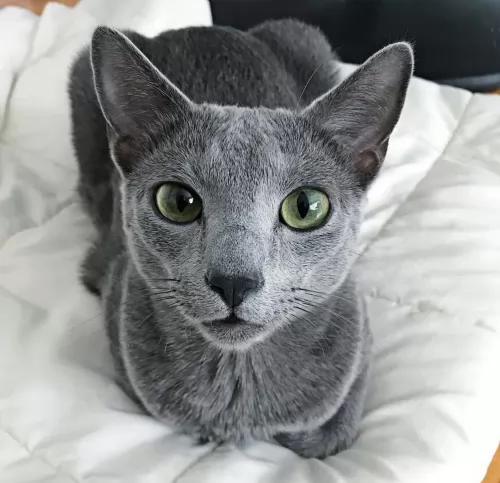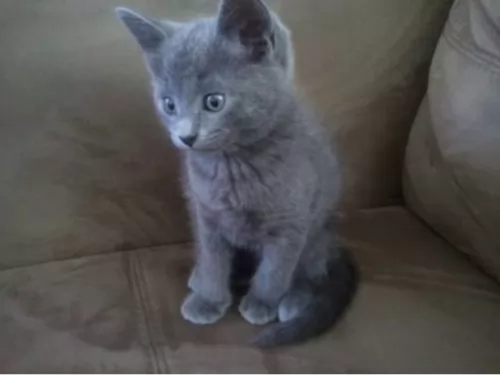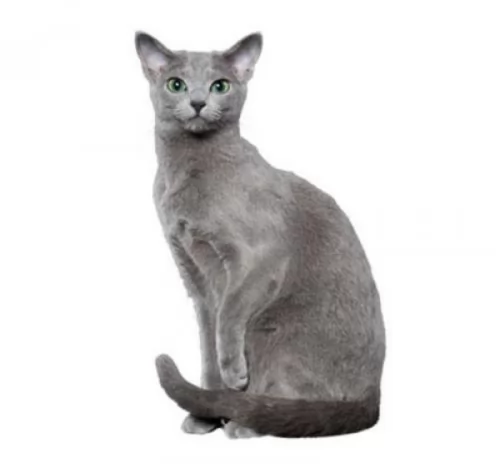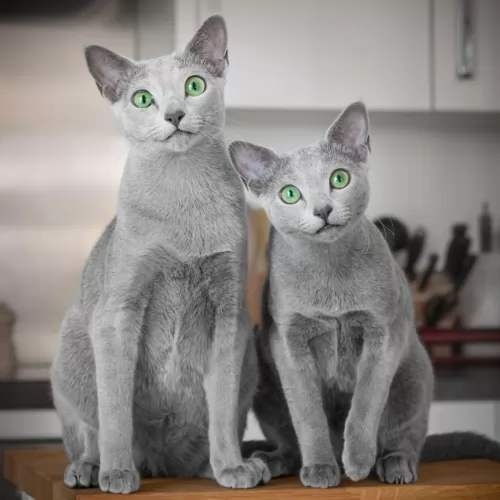 Petzlover
PetzloverAsian is originated from United Kingdom but Blue Russian is originated from Russia. Both Asian and Blue Russian are having almost same weight. Both Asian and Blue Russian has almost same life span. Both Asian and Blue Russian has same litter size. Both Asian and Blue Russian requires Low Maintenance.
Known also as the Malayan, the Asian cat is likened to the Burmese but just with different coat patterns and colors.
This particular cat breed was developed in 1981 in the UK. Apparently there was a mistake mating between a Lilac Burmese and a Chinchilla Persian and kittens from these were born in 1981.
So beautiful were they that a breeding program started with new coat colors and patterns. The breed got the name ‘Asian’ with all the varieties reaching GCCF Championship status.
 The Blue Russian is a rare cat and not much is known about its origins, but it is believed that the cat comes from northern Russia.
The Blue Russian is a rare cat and not much is known about its origins, but it is believed that the cat comes from northern Russia.
The Cat Fanciers Association believes that the cat descended from cats kept by Russian Czars. Research tells us that there is no mention of the Blue Russian until the 19th century. The Russia Blue made its first public appearance in 1875, being exhibited at London’s Crystal Palace as the ‘Archangel Cat’.
By 1912, the Russia Bue was given its own classification after its introduction to the USA in the early 1900s.
The Asian cat is medium-sized and muscular. The male cat is somewhat bigger than the female and weighs roughly 5 – 7kg while the female will weigh roughly 3 – 5kg although most times, there is not much difference in size between the males and females.
The attractive cat has a round head and wide-spaced ears with large green eyes. It’s a slender cat, but athletic with slender legs and medium thickness tail. Asian cats come in a wide range of colors such as fawn, chocolate, black, blue, cinnamon. The coat is short, fine, and silky and the Asian doesn’t require too much grooming.
These are friendly, playful cats and they get on well with children if the children are kind, gentle and respectful with him. This is a fairly dependant cat and he will actually follow his favorite human being, crying out for attention.
The Asian is a social cat and can fit well into different homes. However, because it is a social cat, they require an owner that is willing to spend time with them. They’re cats that are sensitive to the moods of their owners and make excellent companions.
They’re adventurous cats and enjoy exploring and traveling, voicing their opinion on different things as well. The Asian thrives on the attention it gets from their human owners. It’s a sociable cat and is quite talkative too.
 The Russian Blue is a medium-sized cat with a long, finely-boned boy. It is a slender cat, but he appears larger because of his dense double coat.
The Russian Blue is a medium-sized cat with a long, finely-boned boy. It is a slender cat, but he appears larger because of his dense double coat.
He weighs in the region of 3 – 6kg. In spite of the dense and luxurious short silvery coat, the cat doesn’t shed much. The coat can in fact be a silvery shade to a dark slate grey. The eyes are a beautiful green, the ears widely spaced and slightly rounded at the top.
The Russian Blue is a sweet-tempered cat who becomes attached to his human owner and who will even follow his owner much like a dog.
This particular cat breed may be quite shy, but he becomes social around his family members and may even be reluctant to share time with strangers.
He also doesn’t mind spending some time alone if you have to work. Curious and intelligent the Russian Blue is somewhat reserved but he makes a great companion as he is sensitive to his owner's moods.
The Asian cat is such a sweet animal – gentle and affectionate and also very sociable. They are also curious and intelligent and vocal enough to let you know their needs. They're strong-willed if they want something.
The Asian makes an excellent companion for singles, couples, families or the elderly. They also get on well with children and with other pets in the home.
There are quite a few Asian cat varieties and each one promises to make you an excellent companion.
 Russian blue cats are such intelligent creatures and he will require some mental stimulation because of it.
Russian blue cats are such intelligent creatures and he will require some mental stimulation because of it.
He loves mealtimes, but remember to not overfeed him as this shortens his lifespan.
He is a vocal cat and will tell you when he is hungry or he wants to play.
These cats don’t like too many changes so keep things the same for him.
When you try to keep your lovely Blue Russian happy, you’ll be rewarded by having a fantastic feline companion.
Although there are no specific health issues with this cat, because of it being associated with the Burmese, it may be more susceptible to diabetes mellitus than other breeds.
There are many cats in modern times developing diabetes mellitus – where they are unable to produce enough insulin to balance blood sugar. If the disease goes untreated it can lead to dehydration, vomiting, depression, weight loss, and even death. Your cat will be thirsty and urinating more frequently. There are various treatments and the diet for the cat will need to change too.
To take care of the cat’s shiny coat, you can gently brush your Asian every week, not more, as they are short-haired cats, they’re not heavy shedders and they are low maintenance.
Age and general health will influence the way you feed your Asian cat. You’ll want to be feeding your feline friend the very best food there is as this will contribute towards his good health.
If you opt to feed your cat a commercially manufactured cat food, higher protein levels in wet foods might be better for your carnivorous pet. You don’t want to provide your cat with a high protein diet that is deficient in amino acids.
That is why it is important to research cat foods and their ingredients and get to know what are the most important ingredients for your cat to be getting. At all costs, avoid your cat becoming obese.
Make sure your cat has access to fresh cool water to maintain his body temperature.
Check your cat’s teeth, as he can’t convey to you that he is in pain – you need to check inside his mouth. Redness inside his ears might be indicative of an ear infection.
Whenever your cat seems to be ill, get him to the vet.
Provide your cat with a litter box that is kept hygienically clean.
Provide your cat with food- and water bowl, a brush for grooming and warm, dry sleeping basket.
Have your Asian neutered or spayed to prevent unwanted kittens.
Make sure your cat’s vaccines are up to date.
 Part of caring for a cat as a responsible pet owner comes from feeding your pet. The Russian Blue is a cat that enjoys his food so you will have to look out for overfeeding.
Part of caring for a cat as a responsible pet owner comes from feeding your pet. The Russian Blue is a cat that enjoys his food so you will have to look out for overfeeding.
A cat that is overweight can start developing joint problems and diabetes. Rather stick to scheduled meals so that you can know exactly what your feline pet is getting. Such a beautiful cat needs the best food there is to keep the coat shiny and healthy and to prevent illness.
Always read the food labels to ensure the best ingredients and the right portion sizes. Make sure your cat gets food that is meat protein-rich as a cat is a carnivore.
Water is another important part of your Blue Russian’s diet. Fresh cool water should be available for your cat night and day. Water bowls are good but a water fountain is a tantalizingly attractive way for your pet to be attracted to drinking more water.
Make sure that you rake up all your cat’s droppings from the litter box every day as the Russian Blue is a hygienic cat and wants a clean litter box. Make sure the litter box is in a nice quiet spot for your cat.
The cat has a dense coat but isn’t a heavy shedder and requires very little grooming.
Ensure a decent bed for your Bombay cat. Any soft cat bedding will do, and while some cats like a simple flat mattress-type bedding arrangement, other cats like the idea of getting into a bed that provides some privacy.
You just have to find yourself a decent pet shop because when you do, you’ll find a host of soft, warm, fully washable blankets and pillows for your pet. Once you’ve decided on the right bed and a nice quiet spot, your cat will have a complex issue sorted out as some cats can be fussy with their sleeping arrangments.
Make sure your cat is neutered or spayed to avoid unwanted kittens. Neutering offers health benefits, reducing the risk of different cancers. Your cat also no longer has the desire to fight over mates and territory.